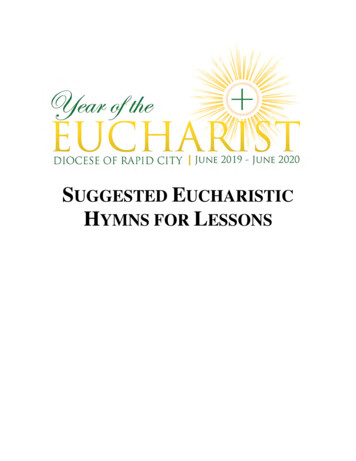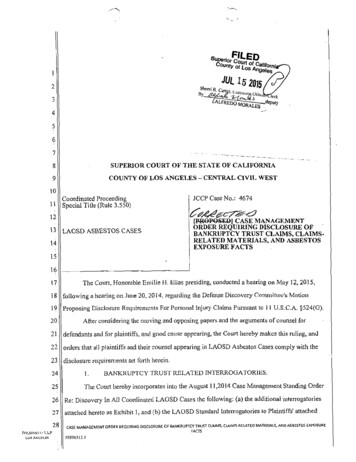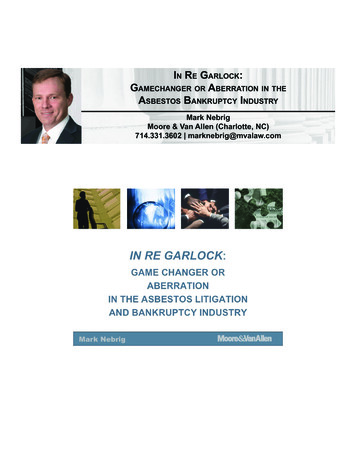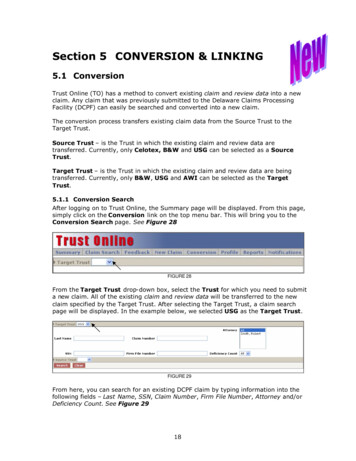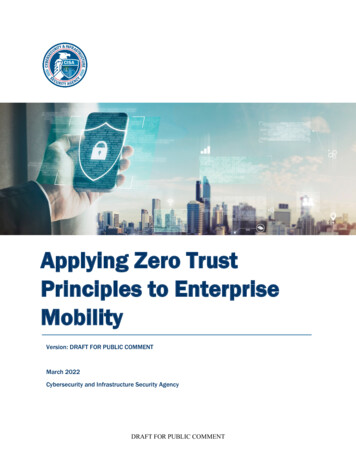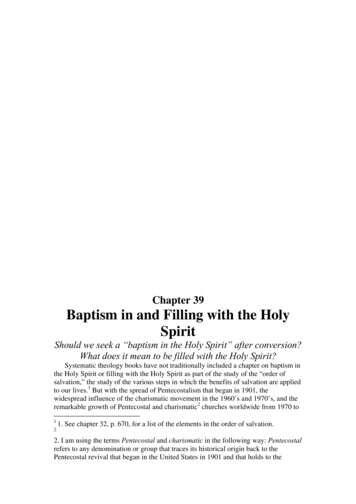
Transcription
Ziesler, J.A. The Meaning of Righteousness in Paul. Cambridge: Cambridge University Press,1972.SCRIPTURE MEMORY PASSAGERomans 6:11–14: So you also must consider yourselves dead to sin and alive to Godin Christ Jesus. Let not sin therefore reign in your mortal bodies, to make you obeytheir passions. Do not yield your members to sin as instruments of wickedness, butyield yourselves to God as men who have been brought from death to life, and yourmembers to God as instruments of righteousness. For sin will have no dominion overyou, since you are not under law but under grace.HYMN“TAKE TIME TO BE HOLY”Take time to be holy, speak oft with thy Lord;Abide in him always, and feed on his Word.Make friends of God’s children; help those who are weak;Forgetting in nothing his blessing to seek.Take time to be holy, the world rushes on;Spend much time in secret with Jesus alone.By looking to Jesus, like him thou shalt be;Thy friends in thy conduct his likeness shall see.Take time to be holy, let him be thy guide,And run not before him, whatever betide;In joy or in sorrow, still follow thy Lord,And, looking to Jesus, still trust in his Word.Take time to be holy, be calm in thy soul;Each thought and each motive beneath his control;Thus led by his Spirit to fountains of love,Thou soon shalt be fitted for service above.Author: William D. Longstaff, 1887Alternate hymn: “Trust and Obey”Chapter 39Baptism in and Filling with the HolySpiritShould we seek a “baptism in the Holy Spirit” after conversion?What does it mean to be filled with the Holy Spirit?Systematic theology books have not traditionally included a chapter on baptism inthe Holy Spirit or filling with the Holy Spirit as part of the study of the “order ofsalvation,” the study of the various steps in which the benefits of salvation are appliedto our lives.1 But with the spread of Pentecostalism that began in 1901, thewidespread influence of the charismatic movement in the 1960’s and 1970’s, and theremarkable growth of Pentecostal and charismatic2 churches worldwide from 1970 to11. See chapter 32, p. 670, for a list of the elements in the order of salvation.22. I am using the terms Pentecostal and charismatic in the following way: Pentecostalrefers to any denomination or group that traces its historical origin back to thePentecostal revival that began in the United States in 1901 and that holds to the
the present, the question of a “baptism in the Holy Spirit” distinct from regenerationhas come into increasing prominence. I have put this chapter at this point in our studyof the application of redemption for two reasons: (1) A proper understanding of thisquestion must assume an understanding of regeneration, adoption, and sanctification,all of which have been discussed in previous chapters. (2) All the previous chapterson the application of redemption have discussed events that occur (or in the case ofsanctification, that begin) at the point at which a person becomes a Christian. But thisquestion concerns an event that occurs either at the point of conversion (according toone view) or sometime after conversion (according to another view). Moreover,people on both sides of the question agree that some kind of second experience hashappened to many people after their conversion, and therefore one very importantquestion is how to understand this experience in the light of Scripture and whatscriptural categories properly apply to it.doctrinal positions (a) that baptism in the Holy Spirit is ordinarily an event subsequentto conversion, and (b) that baptism in the Holy Spirit is made evident by the sign ofspeaking in tongues, and (c) that all the spiritual gifts mentioned in the NewTestament are to be sought and used today. Pentecostal groups usually have their owndistinct denominational structures, the most prominent of which is the Assemblies ofGod.Charismatic refers to any groups (or people) that trace their historical origin to thecharismatic renewal movement of the 1960s and 1970s, seek to practice all thespiritual gifts mentioned in the New Testament (including prophecy, healing,miracles, tongues, interpretation, and distinguishing between spirits), and allowdiffering viewpoints on whether baptism in the Holy Spirit is subsequent toconversion and whether tongues is a sign of baptism in the Holy Spirit. Charismaticswill very often refrain from forming their own denomination, but will viewthemselves as a force for renewal within existing Protestant and Roman Catholicchurches. There is no representative charismatic denomination in the United Statestoday, but the most prominent charismatic spokesman is probably Pat Robertson withhis Christian Broadcasting Network, the television program “The 700 Club,” andRegent University (formerly CBN University).In the 1980s yet a third renewal movement arose, called the “third wave” bymissions professor C. Peter Wagner at Fuller Seminary (he referred to the Pentecostalrenewal as the first wave of the Holy Spirit’s renewing work in the modern church,and the charismatic movement as the second wave). “Third wave” people encouragethe equipping of all believers to use New Testament spiritual gifts today, and say thatthe proclamation of the gospel should ordinarily be accompanied by “signs, wonders,and miracles,” according to the New Testament pattern. They teach, however, thatbaptism in the Holy Spirit happens to all Christians at conversion, and that subsequentexperiences are better called “filling” with the Holy Spirit. The most prominentrepresentative of the “third wave” is John Wimber, senior pastor of the VineyardChristian Fellowship in Anaheim, California, and leader of the Association ofVineyard Churches. Wimber’s two most influential books, Power Evangelism (SanFrancisco: Harper and Row, 1986; rev. ed., 1992) and Power Healing (San Francisco:Harper and Row, 1987), both co-authored by Kevin Springer, are widely recognizedas representative of distinctive “third wave” emphases.The definitive reference work for these movements is now Stanley M. Burgessand Gary B. McGee, eds., Dictionary of Pentecostal and Charismatic Movements(Grand Rapids: Zondervan, 1988).
EXPLANATION AND SCRIPTURAL BASISA. The Traditional Pentecostal UnderstandingThe topic of this chapter has become important today because many Christians saythat they have experienced a “baptism in the Holy Spirit” that came after they becameChristians and that brought great blessing in their lives. They claim that prayer andBible study have become much more meaningful and effective, that they havediscovered new joy in worship, and they often say that they have received newspiritual gifts (especially, and most frequently, the gift of speaking in tongues).This traditional Pentecostal or charismatic position is supported from Scripture inthe following way:(1) Jesus’ disciples were born-again believers long before the day of Pentecost,perhaps during Jesus’ life and ministry, but certainly by the time that Jesus, after hisresurrection, “breathed on them, and said to them, “Receive the Holy Spirit”’ (John20:22).(2) Jesus nevertheless commanded his disciples “not to depart from Jerusalem, butto wait for the promise of the Father” (Acts 1:4), telling them, “Before many days youshall be baptized with the Holy Spirit” (Acts 1:5). He told them, “You shall receivepower when the Holy Spirit has come upon you” (Acts 1:8). The disciples thenobeyed Jesus’ command and waited in Jerusalem for the Holy Spirit to come uponthem so that they would receive new empowering for witness and ministry.(3) When the disciples had waited for ten days, the day of Pentecost came,tongues of fire rested above their heads, “And they were all filled with the Holy Spiritand began to speak in other tongues, as the Spirit gave them utterance” (Acts 2:4).This clearly shows that they received a baptism in (or with)3 the Holy Spirit. Althoughthe disciples were born again long before Pentecost, at Pentecost they received a“baptism with the Holy Spirit” (Acts 1:5 and 11:16 refer to it this way) that wassubsequent to conversion and resulted in great empowering for ministry as well asspeaking in tongues.4(4) Christians today, like the apostles, should ask Jesus for a “baptism in the HolySpirit” and thus follow the pattern of the disciples’ lives.5 If we receive this baptism in33. It does not matter much whether we translate the Greek phrase ἐν πνεύματι as “inthe Spirit” or “with the Spirit” because both are acceptable translations, and people onall sides of this topic seem to use those two expressions rather interchangeably. I haveused “in the Holy Spirit” ordinarily throughout this chapter, but the RSV translationwhich I quote here generally prefers to use “with the Holy Spirit.” I do not make anydistinction between these two phrases in the discussion of this chapter. (But seebelow, pp. 767–68, for a discussion of the frequent claim by Pentecostals that baptismby the Holy Spirit [as in 1 Cor. 12:13] is a different event than baptism in [or with] theHoly Spirit.)44. Most Pentecostal discussions of baptism in the Holy Spirit include the view thatspeaking in tongues is a “sign” that one has been baptized in the Holy Spirit, and thatthis sign will be given to all who have been baptized in the Holy Spirit, even thoughnot all will later have the gift of speaking in tongues as a continuing gift in their lives.55. I personally heard such teaching on baptism in the Holy Spirit as a first-yearuniversity student in 1967, and later privately prayed, as instructed, first repenting ofall known sin and once again yielding every area of my life to God, then asking Jesusto baptize me in the Holy Spirit. Though my understanding of that experience hassince changed, so that I would explain it in different terms (see below), the result in
the Holy Spirit, it will result in much more power for ministry for our own lives, justas it did in the lives of the disciples, and will often (or always, according to someteachers) result in speaking in tongues as well.(5) Support for this pattern—in which people are first born again and then later arebaptized in the Holy Spirit—is seen in several other instances in the book of Acts. It isseen, for example, in Acts 8, where the people of Samaria first became Christianswhen they “believed Philip as he preached good news about the kingdom of God andthe name of Jesus Christ” (Acts 8:12), but only later received the Holy Spirit when theapostles Peter and John came from Jerusalem and prayed for them (Acts 8:14–17).6Another example is found in Acts 19, where Paul came and found “somedisciples” at Ephesus (Acts 19:1). But, “when Paul had laid his hands upon them, theHoly Spirit came on them; and they spoke with tongues and prophesied” (Acts 19:6).All of these examples (Acts 2, 8, sometimes 10, and 19)7 are cited by Pentecostalsin order to show that a “baptism in the Holy Spirit” subsequent to conversion was avery common occurrence for New Testament Christians. Therefore, they reason, if itwas common for Christians in Acts to have this second experience sometime afterconversion, should it not be common for us today as well?We can analyze this issue of the baptism in the Holy Spirit by asking threequestions: (1) What does the phrase “baptism in the Holy Spirit” mean in the NewTestament? (2) How should we understand the “second experiences” that came toborn-again believers in the book of Acts? (3) Are there other biblical expressions,such as “filling with the Holy Spirit,” that are better suited to describe an empoweringwith the Holy Spirit that comes after conversion?B. What Does “Baptism in the Holy Spirit” Mean in the NewTestament?There are only seven passages in the New Testament where we read of someonebeing baptized in the Holy Spirit. (The English translations quoted here use the wordwith rather than in.) 8 The seven passages follow:In the first four verses, John the Baptist is speaking of Jesus and predicting that hewill baptize people in (or with) the Holy Spirit:Matthew 3:11: “I baptize you with water for repentance, but he who is coming after me ismightier than I, whose sandals I am not worthy to carry; he will baptize you with the HolySpirit and with fire.”Mark 1:8: “I have baptized you with water; but he will baptize you with the Holy Spirit.”my life was undoubtedly a positive and lasting one, including a much deeper love forChrist and much greater effectiveness in personal ministry.66. Another example sometimes cited is that of Cornelius in Acts 10. He was a devoutman who prayed constantly to God (Acts 10:2), but when Peter came and preached tohim and his household, Peter and those with him were amazed “because the gift of theHoly Spirit had been poured out even on the Gentiles. For they heard them speakingin tongues and extolling God” (Acts 10:45–46).77. The case of Paul in Acts 9:17 is sometimes mentioned as well, but it is not asclear-cut, since his violent persecution of the church prior to that time indicates thathe was not born again before the Damascus Road experience. But some have seen asimilar pattern in the distinction between his conversion on the Damascus Road andhis receiving the Holy Spirit at the hands of Ananias three days later.88. See above, footnote 3.
Luke 3:16: “I baptize you with water; but he who is mightier than I is coming, the thong ofwhose sandals I am not worthy to untie; he will baptize you with the Holy Spirit and withfire.”John 1:33: “He who sent me to baptize with water said to me, “He on whom you see the Spiritdescend and remain, this is he who baptizes with the Holy Spirit.”’It is hard to draw any conclusions from these four passages with respect to whatbaptism with the Holy Spirit really is. We discover that Jesus is the one who willcarry out this baptism and he will baptize his followers. But no further specification ofthis baptism is given.The next two passages refer directly to Pentecost:Acts 1:5: [Here Jesus says,] “John baptized with water, but before many days you shall bebaptized with the Holy Spirit.”Acts 11:16: [Here Peter refers back to the same words of Jesus that were quoted in theprevious verse. He says,] “I remembered the word of the Lord, how he said, ‘John baptizedwith water, but you shall be baptized with the Holy Spirit.’”These two passages show us that whatever we may understand baptism in theHoly Spirit to be, it certainly happened at the day of Pentecost as recorded in Acts 2,when the Holy Spirit fell in great power on the disciples and those with them, andthey spoke in other tongues, and about three thousand people were converted (Acts2:14).It is important to realize that all six of these verses use almost exactly the sameexpression in Greek, with the only differences being some variation in word order orverb tense to fit the sentence, and with one example having the preposition understoodrather than expressed explicitly.9The only remaining reference in the New Testament is in the Pauline epistles:1 Corinthians 12:13 (NIV mg): “For we were all baptized in one Spirit into one body—whether Jews or Greeks, slave or free—and we were all given the one Spirit to drink.”Now the question is whether 1 Corinthians 12:13 refers to the same activity asthese other six verses. In many English translations it appears to be different, formany translations are similar to the RSV, which says, “For by one Spirit we were allbaptized into one body.” Those who support the Pentecostal view of baptism in theHoly Spirit after conversion are quite eager to see this verse as referring to somethingother than baptism in the Holy Spirit, and they frequently emphasize the differencethat comes out in the English translations. In all the other six verses, Jesus is the onewho baptizes people and the Holy Spirit is the “element” (parallel to water in physicalbaptism) in which or with which Jesus baptizes people. But here in 1 Corinthians12:13 (so the Pentecostal explanation goes) we have something quite different—herethe person doing the baptizing is not Jesus but the Holy Spirit. Therefore, they say, 1Corinthians 12:13 should not be taken into account when we ask what the NewTestament means by “baptism in the Holy Spirit.”This point is very important to the Pentecostal position, because, if we admit that1 Corinthians 12:13 refers to baptism in the Holy Spirit, then it is very hard tomaintain that it is an experience that comes after conversion. In this verse Paul saysthat this baptism in/with/by the Holy Spirit made us members of the body of—“We99. The expression used in all six passages is the verb βαπτίζω (G966, “baptize”) plusthe prepositional phrase ἐν πνεύματι ἁγίῳ (“in [or with] the Holy Spirit”), except thatMark omits the preposition ἐν (G1877). Even so, there is no difference in meaning,because the dative noun alone can take the same sense as the preposition ἐο plus thedative noun. Matthew and Luke also add “and with fire.”RSV RSV—Revised Standard Version
were all baptized in one Spirit into one body” (1 Cor. 12:13 NIV mg). But if thisreally is a “baptism in the Holy Spirit,” the same as the event that was referred to inthe previous six verses, then Paul is saying that it happened to all the Corinthianswhen they became members of the body of Christ; that is, when they becameChristians. For it was that baptism that resulted in their being members of the body ofChrist, the church. Such a conclusion would be very difficult for the Pentecostalposition that holds that baptism in the Holy Spirit is something that occurs afterconversion, not at the same time.Is it possible to sustain the Pentecostal view that the other six verses refer to abaptism by Jesus in which he baptizes us in (or with) the Holy Spirit, but that 1Corinthians 12:13 refers to something different, to a baptism by the Holy Spirit?Although the distinction seems to make sense from some English translations, it reallycannot be supported by an examination of the Greek text, for there the expression isalmost identical to the expressions we have seen in the other six verses. Paul says ἐνἑνὶ πνεύματι.ἐβαπτίσθημεν (“in one Spirit.we were baptized”). Apart from onesmall difference (he refers to “one Spirit” rather than “the Holy Spirit”),10 all the otherelements are the same: the verb is βαπτίζω (G966) and the prepositional phrasecontains the same words (ἐν, G1877, plus the dative noun πνεύματι from πνεῦμα,G4460). If we translate this same Greek expression “baptize in the Holy Spirit” (or“baptize with the Holy Spirit”) in the other six New Testament occurrences where wefind it, then it seems only proper that we translate it in the same way in this seventhoccurrence. And no matter how we translate, it seems hard to deny that the originalreaders would have seen this phrase as referring to the same thing as the other sixverses, because for them the words were the same.But why have modern English translations translated this verse to say, “By oneSpirit we were all baptized into one body,” thus giving apparent support to thePentecostal interpretation? We should first note that the NASB gives “in” as amarginal translation, and the NIV margin gives both “with” and “in” as alternatives.The reason these translations have chosen the word “by” has apparently been a desireto avoid an appearance of two locations for the baptism in the same sentence. Thesentence already says that this baptism was “into one body,” and perhaps thetranslators thought it seemed awkward to say, “in one Spirit we were all baptized intoone body.” But this should not be seen as a great difficulty, for Paul says, referring tothe Israelites, “all were baptized into Moses in the cloud and in the sea” (1 Cor.10:2)—a very closely parallel expression where the cloud and the sea are the“elements” that surrounded or overwhelmed the people of Israel and Moses means thenew life of participation in the Mosaic covenant and the fellowship of God’s people(led by Moses) that the Israelites found themselves in after they had passed throughthe cloud and the sea. It is not that there were two locations for the same baptism, butone was the element in which they were baptized and the other was the location inwhich they found themselves after the baptism. This is very similar to 1 Corinthians12:13: the Holy Spirit was the element in which they were baptized, and the body ofChrist, the church, was the location in which they found themselves after thatNIV NIV—New International Versionmg mg.—margin or marginal notes1010. In this context, in which he is talking repeatedly about the Holy Spirit andspiritual gifts, there can be little doubt that he is referring to the Holy Spirit.NASB NASB—New American Standard Bible
baptism.11 It thus seems appropriate to conclude that 1 Corinthians 12:13 also refers tobaptism “in” or “with” the Holy Spirit, and is referring to the same thing as the othersix verses mentioned.But this has a significant implication for us: it means that, as far as the apostlePaul was concerned, baptism in the Holy Spirit occurred at conversion. He says thatall the Corinthians were baptized in the Holy Spirit and the result was that theybecame members of the body of Christ: “For we were all baptized in one Spirit intoone body” (1 Cor. 12:13 NIV mg). “Baptism in the Holy Spirit,” therefore, must referto the activity of the Holy Spirit at the beginning of the Christian life when he givesus new spiritual life (in regeneration) and cleanses us and gives a clear break with thepower and love of sin (the initial stage of sanctification). In this way “baptism in theHoly Spirit” refers to all that the Holy Spirit does at the beginning of our Christianlives. But this means that it cannot refer to an experience after conversion, as thePentecostal interpretation would have it.121111. In addition to the fact that this Greek phrase found in 1 Cor. 12:13 is translatedto refer to baptism in the Holy Spirit in all the other six occurrences, there is agrammatical argument that supports the translation “in one Spirit we were all baptizedinto one body” in 1 Cor. 12:13: if Paul had wanted to say that we were baptized by theHoly Spirit, he would have used a different expression. To be baptized “by” someonein the New Testament is always expressed by the preposition ὑπό (G5679) followedby a genitive noun. This is the way New Testament writers say that people werebaptized in the Jordan River “by” John the Baptist (Matt. 3:6; Mark 1:5; Luke 3:7) orthat Jesus was baptized “by” John (Matt. 3:13; Mark 1:9), or that the Pharisees hadnot been baptized “by” John (Luke 7:30), or that John the Baptist told Jesus, “I needto be baptized by you” (Matt. 3:14). Therefore, if Paul had wanted to say that theCorinthians had all been baptized by the Holy Spirit he would have used ὑπό (G5679)plus the genitive, not ἐν (G1877) plus the dative. (It is common in the New Testamentfor the agent who performs the action expressed by a passive verb to be named usingὑπό plus the genitive.) Further support for the view that 1 Cor. 12:13 means “in (orwith) one Spirit” is found in M.J. Harris, “Prepositions and Theology in the GreekNew Testament,” in NIDNTT vol. 3, p. 1210.1212. Howard M. Ervin, Conversion-Initiation and the Baptism in the Holy Spirit(Peabody, Mass.: Hendrickson, 1984), pp. 98–102, admits that 1 Cor. 12:13, howeverit is translated, does refer to the beginning of the Christian life (he says it is“initiatory,” p. 101), but then he says that the next phrase, “we were made to drink ofone Spirit” (his translation) refers to a subsequent empowering for service. He alsosays that Paul’s use of the phrase “baptism in the Holy Spirit” is different from thesense the phrase takes in the other six occurrences in the New Testament. Thus, heapparently grants the non-Pentecostal interpretation of 1 Cor. 12:13, but still says thatPaul uses the same phrase with different meaning. Yet this argument does not seempersuasive. It would be very unlikely if Luke, who was Paul’s traveling companionthroughout much of his missionary activity, and who was probably with Paul in Romewhen he wrote the book of Acts (Acts 28:30–31), would use a phrase in a differentsense than Paul, or that Paul would use this phrase in a different sense than the sensein which it was so prominently used by Matthew, Mark, Luke and John.Another attempt to avoid our conclusion on 1 Cor. 12:13 is found in John P.Baker, Baptized in One Spirit (Plainfield, N.J.: Logos Books, 1970), pp. 18–25, wherehe argues that 1 Cor. 12:13 does not mean that we were baptized into one body, but
But how, then, do we understand the references to baptism in the Holy Spirit inActs 1:5 and 11:6, both of which refer to the day of Pentecost? Were these notinstances where the disciples, having previously been regenerated by the Holy Spirit,now experienced a new empowering from the Holy Spirit that enabled them tominister effectively?It is true that the disciples were “born again” long before Pentecost, and in factprobably long before Jesus breathed on them and told them to receive the Holy Spiritin John 20:22.13 Jesus had said, “No one can come to me unless the Father who sentme draws him” (John 6:44), but the disciples certainly had come to Jesus and hadfollowed him (even though their understanding of who he was increased graduallyover time). Certainly when Peter said to Jesus, “You are the Christ, the Son of theliving God” (Matt. 16:16), it was evidence of some kind of regenerating work of theHoly Spirit in his heart. Jesus told him, “Flesh and blood has not revealed this to you,but my Father who is in heaven” (Matt. 16:17). And Jesus had said to the Fatherregarding his disciples, “I have given them the words which you gave me, and theyhave received them and know in truth that I came from you; and they have believedthat you sent me.I have guarded them and none of them is lost but the son ofperdition, that the scripture might be fulfilled” (John 17:8, 12). The disciples had“little faith” (Matt. 8:26) at times, but they did have faith! Certainly they wereregenerated long before the day of Pentecost.14that we were baptized “for the one body of Christ” (p. 24). But Baker’s argument isnot convincing, because the word “for” at the beginning of v. 13 shows that it must bean argument that supports v. 12, where Paul says that we are many members, but onebody. Yet in order for v. 13 to show that all Christians are a part of one body, it isnecessary for v. 13 to communicate why we are all members of one body, and Pauldoes this by showing that we are all baptized into one body. Baker’s view, that thishappens only to some “who are already members of the body of Christ to enable themto function effectively” (p. 24), is not convincing in view of Paul’s statement that“all” Christians were baptized into one body. Moreover, baptism for the benefit of onebody (which is essentially what Baker takes it to mean) gives a very unusual sense tothe preposition εἰς (G1650)— if Paul had meant this, we would have expectedsomething like ἕνεκα (from ἕνεκεν, G1915) “for the sake of,” or ὑπέρ (G5642) plusthe genitive, meaning “in behalf, for the sake of.”1313. When Jesus breathed on his disciples and said to them, “Receive the HolySpirit” (John 20:22), it probably was an acted-out prophecy of what would happen tothem at Pentecost. In this same context—in fact, in the verse immediatelypreceding—Jesus had told them something that would not happen until Pentecost:“As the Father has sent me, even so I send you” (John 20:21). But even though he saidthis before he had ascended into heaven, he did not really send them out to preach thegospel until the Day of Pentecost had come. Therefore his words were lookingforward to what would happen at Pentecost. It is best to understand the words in thenext sentence, “Receive the Holy Spirit,” in the same way—he was speaking inadvance of something that would happen on the Day of Pentecost. On that day theywould receive the new covenant fullness and power of the Holy Spirit, a much greaterempowering of the Holy Spirit than what they had experienced before.1414. I do not mean to say that believers’ experience of regeneration in the oldcovenant was exactly the same as that of new covenant believers. Whileconsiderations listed in the following discussion indicate a less-powerful work of theHoly Spirit in the old covenant, defining the nature of the differences is difficult, since
But we must realize that the day of Pentecost is much more than an individualevent in the lives of Jesus’ disciples and those with them. The day of Pentecost wasthe point of transition between the old covenant work and ministry of the Holy Spiritand the new covenant work and ministry of the Holy Spirit. Of course the Holy Spiritwas at work throughout the Old Testament, hovering over the waters of the first dayof creation (Gen. 1:2), empowering people for service to God and leadership andprophecy (Ex. 31:3; 35:31; Deut. 34:9; Judg. 14:6; 1 Sam. 16:13; Ps. 51:11, et al.).But during that time the work of the Holy Spirit in individual lives was, in general, awork of lesser power.There are several indications of a less powerful and less extensive work of theHoly Spirit in the old covenant: the Holy Spirit only came to a few people withsignificant power for ministry (Num. 11:16–17, for example), but Moses longed forthe day when the Holy Spirit would be poured out on all of God’s people: “Wouldthat all the LORD’s people were prophets, that the LORD would put his spirit uponthem!” (Num. 11:29). The equipping of the Holy Spirit for special ministries could belost, as it was in the life of Saul (1 Sam. 16:14), and as David feared that it might bein his own life (Ps. 51:11). In terms of spiritual power in the lives of the people ofGod, there was little power over the dominion of Satan, resulting in very littleeffective evangelism of the nations around Israel, and no examples of ability to castout demons.15 The old covenant work of the Holy Spirit was almost completelyconfined to the nation of Israel, b
today, but the most prominent charismatic spokesman is probably Pat Robertson with his Christian Broadcasting Network, the television program “The 700 Club,” and Regent University (for
